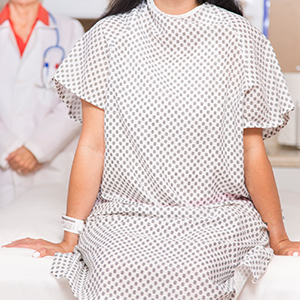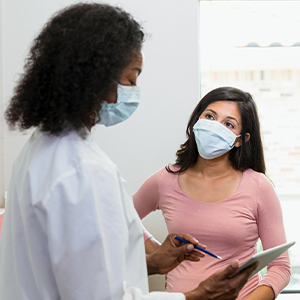Is it Time for your Mammogram? Breast Cancer Screening Guidelines

When was the last time you had a screening mammogram for breast cancer? If you’re age 40 or over, we hope it’s within the last year.
According to the American Society of Breast Surgeons (ASBrS), all women should have regular mammograms starting at age 40 regardless of risk or family history. Early detection helps find breast cancer early, which leads to early treatment and better odds of survival.
“Three out of every four women diagnosed with breast cancer have no family history of the disease and aren’t considered high-risk,” said Ryan Holmes, MD, Radiologist with Grand Traverse Radiologists, PC. “That’s why we encourage all women to talk to their primary care provider and follow a screening plan designed especially for them.”
Regular screening reduces breast cancer deaths by more than 30 percent. If you’re due for a screening, or if you’ve never had a mammogram before, the following ASBrS guidance should help you determine your next steps.
Start with a formal risk assessment

Seventy-five percent of women diagnosed with breast cancer had no family history of the disease. That’s why all women between the ages of 25 and 30 should have a formal assessment performed by a physician.
This series of questions will evaluate your risk and help inform your mammography screening schedule.
Your formal assessment should be updated at regular intervals as your age and risk factors change. Never had one? Take our online sample breast health risk assessment.
Screening for women with average risk
Your risk for breast cancer may be considered average if you:
- Have never had breast cancer before.
- Do not have a strong family history of breast cancer.
- Do not have a genetic mutation known to increase the risk for breast cancer, such as a BRCA1 or BRCA2 gene mutation.
- Have not had chest radiation therapy before the age of 30.
According to the ASBrS, women with an average risk should receive regular screening mammograms starting at age 40. However, women at average risk with dense breast tissue should consider supplemental imaging, such as breast magnetic resonance imaging (MRI) screening or digital breast tomosynthesis, which is commonly known as a 3D mammography.
A 3D mammogram, which combines multiple low-dose x-rays of the breast tissue into a single detailed image, is available at most Munson Healthcare screening locations.
Screening for women with high risk

Your breast cancer risk is high if:
- A test found that you have a genetic mutation known to increase the risk for breast cancer, such as a BRCA1 or BRCA2 gene mutation.
- Your parent, sibling, or child had breast cancer with a BRCA1 or BRCA2 gene mutation and you have not had a genetic test.
- Your doctor calculates that your lifetime risk for breast cancer is about 20 to 25 percent or more, based on your family history.
- You had chest radiation therapy between the ages of 10 and 30.
If you have a high risk for breast cancer, the ASBrS recommends having a mammogram regularly starting at the age of 30. You should also receive a breast MRI test every year to allow radiologists to see more detail. In addition:
Women younger than age 50 with a history of breast cancer, or who have dense breasts, should have a mammogram every year and supplemental imaging as recommended by their doctors.
Women aged 50 or older with a history of breast cancer and who have non-dense breasts should have a mammogram every year. Skipping a Mammogram every other year, even after age 50, would miss up to 30 percent of cancers.
All women, regardless of risk, should continue having regular mammograms until their life expectancy is less than 10 years.
Scheduling your mammogram

Breast cancer screening recommendations vary among different organizations, so be sure to speak with your primary care provider or family doctor to determine your ideal screening schedule. Finding and treating breast cancer early will ensure you have the best chance for a successful outcome.
If you don’t have a healthcare provider, please call Munson Healthcare Ask-A-Nurse at 231-935-0951 for help finding one nearby. Learn more about breast cancer screening and treatment at munsonhealthcare.org/pink.